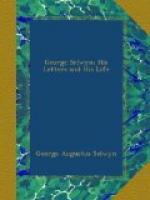(195) Thomas, third Duke of Newcastle (1752-1795). He married in this year, the second daughter of the Earl of Harrington.
We have now nearly reached the climax of the political interest and excitement which had been growing greater since the memorable session of 1781 began. To appreciate the letters which follow, it is necessary to bear in mind some of the main parliamentary incidents of this particular period. On February 7, 1782, the House of Commons resolved itself into a Committee to inquire into the present state of naval affairs. Fox in an elaborate speech reviewed their course for the preceding five years, and concluded by moving “that there has been gross mismanagement of the naval affairs of Great Britain during the course of the year 1781.” The supporters of the Government were as little satisfied with the administration of the navy as the Opposition, and the debate, which was concluded by another remarkable speech from Fox, resulted in a virtual defeat of the Administration. The Opposition were in a minority only of 18 votes. On February 22nd a different ground was chosen by the Opposition for their attack, General Conway moving an address that the war in America should no longer be pursued. The noticeable change in the feeling in the House of Commons, crammed as it was by place-men, is clearly exemplified by the result of the division. On this occasion the Government were only able to defeat the Opposition by one vote, 194 to 193. On February 27th a similar address was again moved by Conway and an attempt by the Government to adjourn the debate was defeated by 234 to 215 votes. The address was then carried without a division. Selwyn looking at events from what was, politically speaking, a somewhat non-party point of view, is obviously puzzled as to how the crisis would end. He tells us, too, of the formation of a group of young politicians under Pitt. He ascribes to the future Prime Minister the organisation of a party, though hitherto these meetings at Goosetree’s have been regarded chiefly as social gatherings.
(1782,) Feb. 8, Friday, the Fast Day.—We were not up last night till near three this morning; our numbers were 205 and 183. Our majority was but mince, but it was a popular Question, but Lord Sandwich is not a popular man; but I have lived long enough to have remembered other ministers less popular, if possible, and who have been since reverenced, and by the most respectable among those who had traduced them. Charles made two speeches; the last was much animated. Admiral Keppell spoke, and so did Sir E. Dering, drunk, sicut suus mos est; but he says in that ivresse des verites vertes et piquantes. He is a tiresome noisy fool, and I wish that he never spoke anywhere but in the House of Commons.




